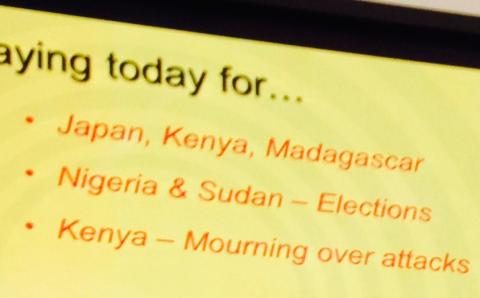As the illiterate daughter of an impoverished widow in Senegal, West Africa, young Fama Fané was almost left behind.
In Fama's community, poverty and cultural traditions associated with gender play a large role in the decisions that parents make about the education and marriage of their children. So when Fama's father passed away, her mother pulled Fama out of school because she could no longer afford to send her.
Instead, like many young girls in Senegal, Fama stayed at home to help with household chores and to prepare food to sell at the market. Without an education, it was likely that Fama would have very limited opportunities and would be left behind as others in her community pursued jobs and further learning.
Fama’s story is not uncommon in West Africa. Young people from poor families are immediately at a disadvantage when it comes to opportunities for education and vocation.
For girls, the situation is even more challenging. It is common for girls to never be sent to school at all. If they do go to school, they are often pulled out early when a family member gets sick, passes away, or loses a job, since the education of boys is considered a priority. The literacy rates in Senegal indicate that 61.3 percent of adult women are illiterate, compared with 38.2 percent of adult men.
Once a girl is pulled out of school, she is less likely to know her rights, more likely to marry early, more likely to live in poverty, and more likely to suffer the health consequences of early pregnancies. Her children are also more likely to be uneducated.
In communities like Fama’s, World Renew is working through local church partners to equip men and women to use their God-given gifts and fully enjoy their human rights.
“Since God created both male and female in his image, each gender has inherent equal value, even though their biological roles are different,” said Ida Kaastra-Mutoigo, World Renew-Canada's director.
“World Renew is committed to work for gender equality and equity in all aspects of its programs, policies, and organizational culture,” Kaastra-Mutoigo added. “In our work with thousands of communities around the world, we have seen that the work of community transformation is unachievable when one gender is left behind, ignored, or discriminated against.”
Educating women is a priority in World Renew's gender justice programs.
In Senegal, World Renew's adolescent health program has helped a generation of girls to make their voices heard about the issues that affect them, including marriage, children, and health. It also helps parents and other community members—including men and boys—to organize to support them.
Fama’s future opened up when a peer educator—a program leader who is slightly older than the students and who is trained to teach health and justice issues—invited her to join this World Renew program.
One of the first topics that she and other teens in her neighborhood youth group discussed was their dreams for the future. Although she had no money or opportunity for training, Fama wanted to be a seamstress.
Fama also took advantage of the training the adolescent health program offers in areas such as healthy family and peer relationships, good hygiene, reproductive health, and avoiding risky behaviors and sexually transmitted infections.
She joined a youth action group where she developed leadership and debating skills by organizing community activities about local social problems and issues.
These activities included celebration events where youth share their learnings from the program on a larger scale. At each event, participants perform a skit on topics such as incest, domestic violence, early pregnancy, and forced marriage.
“Parents are often afraid to talk with their children about issues like adolescent health and how to take care of their body,” explained World Renew program consultant Esther Kuhn. “There is a big cultural taboo on these topics.”
Kuhn says the adolescent health program community events have opened doors of communication between parents and children. They also have helped to empower girls and boys to stand up for justice in their families and neighborhoods.
Fama’s participation in community events strengthened her good reputation and won the respect of other young people in her neighborhood.
Last year, Fama was one of 19 young women selected to participate in a new vocational education program. She is learning the skills of the sewing trade—cutting, stitching, and pattern-making—as well as taking general classes such as French and physical education.
“When I complete vocational school, I will receive a diploma,” she says. “Then I hope to open my own sewing shop so I can take care of myself and support my mother.
“World Renew’s adolescent health and rights program is helping me realize my dream. I will try my hardest not only to succeed, but to make sure that other girls can also benefit.”
Working the Fields Together
Although gender equality can be misunderstood as trying to advance women at the expense of men, World Renew’s gender justice ministry emphasizes the importance of recognizing that “all are one in Christ, whether male or female” (Gal. 3:28), and, as children of God, they are all valuable.
This involves working to restore relationships in families and communities. It might also involve advocating for a change in cultural or legal traditions that make it difficult for men and women to be equally involved in making decisions that affect both genders.
A community farmers group in Guatemala’s Polochic Valley is one example of men and women working together to create a society where everyone can contribute and everyone benefits.
Julia, one of the farming group’s leaders, described it this way: “We were taught that men and women had different roles in society that couldn't and shouldn’t be mixed. Men were the ones who had control in all the situations and women just had to obey.
“If there was opportunity to study and work, men were the ones to take it and women were to care of the house and for having children. In the same way, men couldn’t work with women in the fields.”
Community members were exposed to a new way of thinking when World Renew’s local partner, the Association of Integral Development, started to offer training in gender attitudes and introduced the option of farming groups that included both men and women.
In addition to restoring relationships at the community level, World Renew’s gender justice work also involves righting relationships at home—between parents and children, siblings, and couples.
In one community in Kenya where World Renew is working to improve maternal and child health, for example, couples are learning to collaborate and communicate in new ways as they undertake project activities together.
Ten months into this project, which focuses on improving household nutrition through kitchen gardens and small animal raising, World Renew team leader Davis Omanyo noticed a startling difference in progress from household to household.
“We realized that some households were beginning to produce enough nutritious food to feed their families, but others were not—even though they were in the same environment,” said Davis Omanyo, the World Renew team leader. “The key is whether or not cooperation happens at the household level.”
In some of the households involved in the nutrition project, for example, family members resisted taking on new projects such as kitchen gardens.
Alfunse and his wife are an example of two family members who learned how to work together on a household level in a new way.
“The minute my wife came home with chickens from World Renew and wire mesh for making a poultry house, I was challenged. I had no choice but to help her,” Alfunse said. “Since there was no one to build the chicken house, I did it.”
Alfunse’s wife gained confidence based on her new knowledge and began to use that confidence to share her knowledge with her husband.
“I realized that she was determined to make sure that we have vegetables to eat because she created a vegetable garden out of an old sisal sack,” Alfunse explained. “Now we eat fresh vegetables from our own garden.
“She also told me how to take care of her when she is pregnant and how to take care of our baby after delivery. This is education I had not received anywhere else.”
When Omanyo spoke with other men involved in the project, many of them said that the project had brought them closer to their wives.
“We are now learning from our wives. We do not care what other men say about us—all we know is that we are now living a better life than before,” said one man.
“I now help my wife collect water using my bicycle. It is a long distance, and for many years my wife has collected the water and come home tired. Now we are a happy family.”
This community’s story shows that gender equality requires the willing participation of both men and women.
“Pray with us as we work with these communities,” said Omanyo. “We feel the Lord guiding us in the work.”
Please pray . . .
- Give thanks to God for reconciled relationships and better communication between men and women involved in these World Renew programs.
- Give thanks to God for evidence of improved health for mothers, babies, and families as a result of cooperation between men and women.
- Ask God to continue to awaken more young men and women to the issues of gender equality so that they can know their rights, make good choices, and help pave the way for future generations.
- Ask God to comfort those who have experienced the pain of gender discrimination and connect them with people who can help them recognize their true value and potential.
Ask God to equip his children around the world to treat each other with love and respect, so that there is “no division in the body, but that its parts should have equal concern for each other. If one part suffers, every part suffers with it; if one part is honored, every part rejoices with it” (1 Cor. 12:25-26).
About the Author
Adele Konyndyk is a communications writer for World Renew, a creative writer, and a member of First Hamilton Christian Reformed Church in Ontario.








